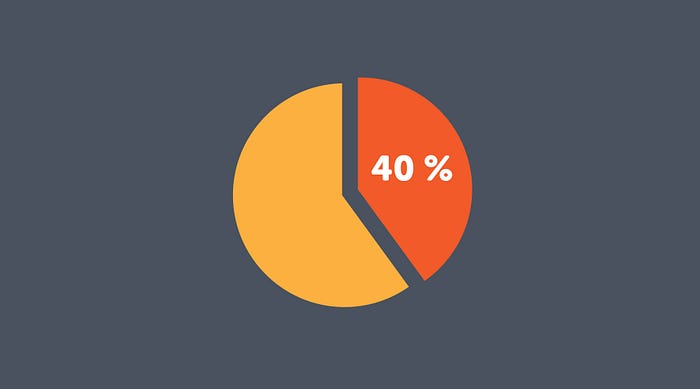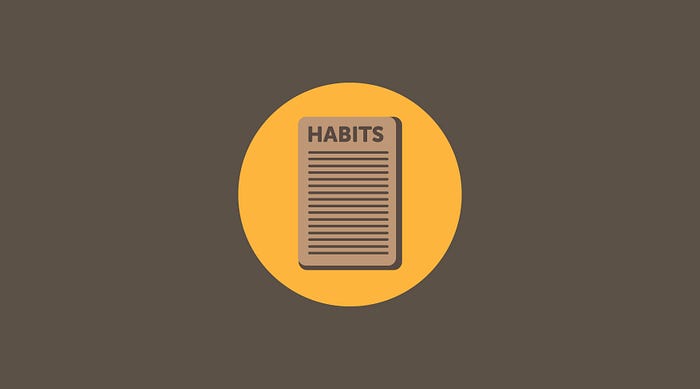Habits are extremely stable. Nevertheless, there is a lot of agitation about them — especially when New Year is approaching. We want to get rid of the bad habits, we want to get us some good ones: Less smoking, binge-watching, face-stuffing; more sports, spinach and Spanish lessons.
While everyone is busy giving you tips on how to stick to your New Year’s Resolutions, I want to take a step back from all the hustle and bustle. Habits are such an interesting invention! So before you go and change them all, take a moment to appreciate the role habits play in your life.
I have collected some interesting facts for you.

1. Habits are the ultimate energy saver
Can you remember when you learned to tie your shoelaces? How your parents showed you each step, how the strings kept slipping through your fingers and the loop would never be tight enough? Imagine you would have to figure out shoelaces each morning anew.
Each. And. Every. Day.
In a life without habits you would never be fully dressed before noon.
Habits work like autopilots. While they let you pretty automatically brush your teeth, conduct your car or empty the dishwasher, your mind is free to do other things. You can make plans in your head, think something through or engage in daydreams.
But how is it that you can switch to autopilot?
When you do something for the first time, there is no autopilot mode — you will always have to concentrate on it. You will have to invest some of the kind of mental energy that you also need for making a difficult decision or solving a math equation. Yes, tying shoelaces was like higher algebra when you did it for the first time!
However, once you have done something over and over again, the repetition leaves an imprint in your brain — the same way a dirt track emerges when people keep using the same path. This imprint makes it possible for your brain to steer the action without much cognitive effort. With a strong habit there is hardly any need for your conscious mind to be involved in the process. This is why you get dressed and put on your shoes effortlessly in the morning, even if you are still half asleep.

2. Over 40 percent of what you do is habitual
Every day a new adventure? Maybe. But the rest of your day is probably still pretty unsurprising. Researchers found that about 45 percent of the activities people did, were performed nearly each day under almost the same circumstances. You make use of your autopilot for almost half of your waking time!
Although this might seem unsettling on first contemplation, it is only logical: You encounter masses of new information every day that can only be dealt with if you focus mental energy on them. But your mental energy is not inexhaustible. So if you can save some of it by getting up on the same side of the bed everyday and not thinking which tooth you should brush first — perfect! That leaves more mental resources for the new challenges you encounter each day.
Increasing what you do habitually, can even be a tactic: President Obama, for example, only wears gray and blue suits, so he does not waste precious mental energy on his outfits.

3. It takes, on average, around 66 days to change a habit
There is a myth about 21 days. Don’t buy it. Most likely you will not be able to implement your New Year’s Resolutions before February.
In fact, it is hard to provide you with a number at all. It depends largely on the kind of routine you want to change. Research suggests that on average it takes around 66 days to change a habit. In the study, however, there were people who made it in 18 days and those who would have needed more than 250 days. Not to mention those who did not make it at all.
Habit change is a complex psychological process — and it is different for each person and every habit.

4. You never forget a habit
Even if after 66, 111 or 222 days you have changed your habit — that does not mean that you have forgotten it. In fact, much points to the fact that we never forget habits.
We might manage to avoid the dirt track which a habit has ingrained in our brain — but the path will always stay. That means that you still know how to handle the gears, even if you have not driven a car for years — you will quickly find your way back on those old dirt tracks in your brain. But it also means that a stressful phase can send you back into old smoking habits even if you quit years ago.

5. Habits are relicts of your past goals
You know that habits never really go away. But where do they come from? The simple explanation is: From doing something under similar circumstance, over and over again. But recently scientist have tried to look at the bigger picture. More precisely: On why you would do something over and over again. Usually, this will not happen by accident, but for a reason.
When you practiced tying your shoelaces, your goal was to finally be able to do this alone. With many habits it might be a lot harder to tell which goal you were pursuing when you established them — but most likely your habits established with regard to a goal.
You might have started regular smoking for your street cred or gobbling sweets so that your siblings would not eat them all before you even got started. Those goals were somewhat reasonable at the time. However, once these actions were repeated often enough to become a habit, the initial goals — infact, ANY goals — lost their significance.
Your habits do not care that your siblings live somewhere else now, that street cred is totally dispensable in your office job and that your new goal is “adopting a healthier lifestyle” — which obviously conflicts with sweets and cigarettes. Your habits are just there, persevering relicts of your past goals that lost all interest in any of your goals.
So you see, habits are a big part of your life. And no matter if they are useful or harmful — they are always persistent.
If you want to change your habits, you should start by trying to understand them better — the more you know about your habits, the easier it will be for you to change them.





Comments